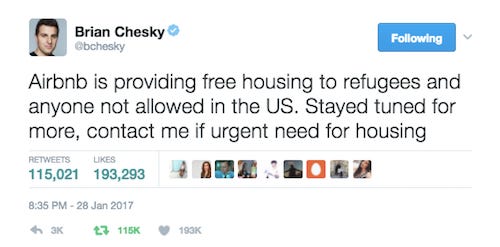Rebellion.
Silicon Valley is in revolt over Donald Trump’s executive actions on immigration.
Google: Thousands of employees walked out of offices worldwide. Co-founder Sergey Brin appeared at a protest at San Francisco International airport. CEO Sundar Pichai: “We need to stand together.” Eric Schmidt: The Trump administration will do “evil things.”
Apple’s Tim Cook: “Apple would not exist without immigration.”
Box’s Aaron Levie: “On every level—moral, humanitarian, economic, logical, etc.—this ban is wrong and is completely antithetical to the principles of America.”
Netflix’s Reed Hastings: The ban is “so un-American it pains us all.”
Slack’s Steward Butterfield: Matching donations to the ACLU, Southern Poverty Law Center, MALDEF, NAACP, and ProPublica.
Let’s not forget the strong showing from the sharing economy.
Airbnb: Set up a website for people to volunteer to house refugees and others barred from the US. Tagline: “Help create a world where anyone can belong anywhere.” Register here.
Instacart: Donating $100,000 to the ACLU. Founder and CEO Apoorva Mehta: “I’m really sad and angry with what has happened over the last few days in our country.”
Lyft: Donating $1 million to the ACLU over the next four years. Co-founders Logan Green and John Zimmer: “We stand firmly against these actions, and will not be silent on issues that threaten the values of our community.”
Postmates: Matching donations by Postmates employees to the ACLU and International Refugee Assistance Project. Co-founder and CEO Bastian Lehmann: “I no longer believe it is reasonable to remain silent.”
Uber: Creating a $3 million fund to help thousands of drivers with immigration and translation services. Plans to compensate drivers barred from the US for their lost earnings. Travis Kalanick, Uber’s CEO and a member of Trump’s business advisory council: The ban is “wrong and unjust.”
Read Quartz’s complete, A-Z guide to the tech backlash. Not on the list? Email me.
Outrage.
Ok, onto the thing everyone is talking about. Uber became the target of liberal outrage this weekend after a guy on Twitter accused it of attempting to break up a taxi workers’ strike at New York’s JFK airport on Saturday night (Jan. 28), and also mentioned that Kalanick was serving on Trump’s business advisory council (he joined Dec. 14). You would think that by now we would have started to be wary of stories that trace to an angry tweet, but no. Just like that, #deleteUber was born.
Here’s what happened at JFK on Saturday. (Note: Most of this is excerpted from a piece I already wrote for Quartz. Also, a not-insignificant number of people on Twitter—see previous comment about angry people on Twitter—seem to believe I am out to promote Uber, to which I can only refer them to my previous work):
Shortly before 5pm, the New York Taxi Workers Alliance, an association of professional drivers in New York City with a large Muslim and immigrant membership, tweeted and posted on Facebook that its members would stop pickups at JFK from 6pm to 7pm, to protest Trump’s immigration order.
At 7:22pm, as protestors amassed at the airport, JFK tweeted that the AirTrain, which provides service from nearby subway stops to the actual terminals, would only admit ticketed passengers and airport employees to “control crowding.”
Also at 7:22pm, the Port Authority emphasized that the AirTrain limitations were being implemented for public safety.
At 7:36pm, Uber’s New York City account tweeted that surge pricing—its system of increasing fares in areas with high demand—had been turned off at JFK.
At 8:06pm, New York governor Andrew Cuomo ordered the Port Authority to reverse its AirTrain decision.
At 8:38pm, the angry tweet.
On Sunday, as #deleteUber trended, Lyft announced its $1 million donation over four years to the ACLU. Kalanick, who on Saturday said Uber was working to identify and compensate drivers affected by the immigration ban, tried to do damage control. He posted a stronger statement, calling the immigration order “wrong and unjust.” He said Uber’s lawyers would be on call to offer drivers legal support, and that the company was creating a $3 million fund to help thousands of drivers “with immigration and translation services.”
Let’s return to Saturday night at JFK. The moment the taxi workers’ strike began and AirTrain service for non-ticketed passengers (i.e., protestors) was suspended, Uber was, operationally speaking, in a bind. If the company allowed prices to increase due to congestion—as it usually would—riders would have been furious and accused Uber of gouging during a civil protest (worse, imagine a newly released detainee having to pay five times the normal fare to get home). If Uber suspended service at JFK entirely—in solidarity with the taxi strike—protestors and people trying to get to their flights would largely be stranded, while drivers who did want to work wouldn’t have the option. So Uber did what was logically best: It turned off surge, ensuring that those who needed a ride could get one without paying extra, but didn’t force or even encourage drivers to keep working.
To be sure, there are plenty of reasons to dislike Uber. The company has broken local laws, attacked politicians, and offended entire cities. It has signed thousands of people into auto-financing arrangements with questionable terms and systematically misled its US drivers about how much they can really make on the platform. Uber has played fast-and-loose with user privacy, championing it to prying regulators while all but forcing riders to let its app track them constantly. Kalanick, before he refined his image, was known for saying obnoxious things like “hashtag winning” and “Boob-er.”
But for the most part, the #deleteUberers weren’t acting on those reasons. Many seemed not even to understand what had happened. Instead, they read unsubstantiated claims that Uber had tried to bust a protest at JFK, or heard its CEO had just joined a Trump advisory group (remember! he joined Dec. 14), and they decided Uber stood for everything wrong with corporate America. Many then installed Lyft, which has surged to fourth place among free downloads in the iOS app store. Had people mobilized behind a similarly unsubstantiated conservative cause, we might say they were duped by “fake news.”
Could Uber have done more? Sure. Did it do a lot? Absolutely. Should you be outraged at Kalanick for joining Trump’s advisory team? Maybe! But condemning a company that took a stand when far, far more remained silent? That doesn’t seem like it’s helping anyone very much.
Booze.
Postmates is ramping up alcohol deliveries in San Francisco and Los Angeles and plans to expand its selection from liquor stores in other cities in the coming months, Recode reports. Postmates guarantees alcohol deliveries in 25 minutes and aims to generate $10 million in revenue from the category in 2017. The company charges $2.99 for delivery plus a 9% service fee for alcohol orders of $30 or less, aka a surcharge of at least 19% and probably more. Alcohol might have good margins but it’s also a tricky business, governed by a complex web of regulations on production, distribution, and sellers. It can also require buying an expensive delivery license to be in the clear, and it’s an open question how that will fit with Postmates independent contractor model.
Safr.
It’s baaaaaack. Safr, the company formerly known Chariot for Women, is reportedly organizing private tests and plans to launch its female-only ride service in Boston this spring. Is it legal? We still don’t know! Experts are skeptical. I encourage all of you to read my interview from last year with Safr co-founder Michael Pelletz, who talked about setting up his website on GoDaddy (“I had a nice girl who did it for me”), his personal idol (“I just always saw myself like Richard Gere [in Pretty Woman]”), and why he felt comfortable selling female empowerment, as a man (“I was meant to do this”).
Trust me, you’ll enjoy it.
Other stuff.
Tostitos “Party Safe” bag tells drunk people to take Uber. Lyft + Zenefits = commuter benefits. Lyft cuts staff, starts collecting cancellation fees from drivers. Airbnb is profitable. India threatens to halt ride-sharing. Uber clears $1 million in annual lobbying spend. Uber blocked in Argentina. Uber donates $10,000 to women’s shelter in Pittsburgh. Uber fights fine in Pennsylvania. Pennsylvania approves permanent license for Uber. Uber’s driverless cars head back to San Francisco. Uber passes Starbucks as no. 1 business traveler expense. Airbnb adds one host, one home in Portland. Q&A with Instacart co-founder. Fitbit cuts 110 jobs. Uber scammers. UberCloud. Airbnb Handsfree. America Is Torn Apart by Partisan Politics, Except When It Comes to Buying Solar Power. Forget Being an Uber Driver—Dog-Sitting Is the New Side Hustle.







